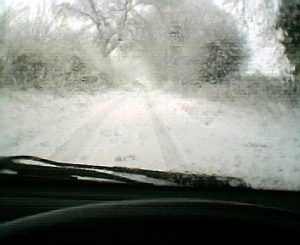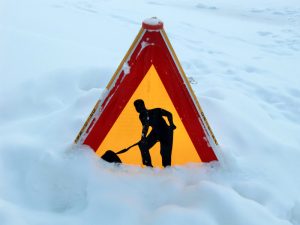You might find you simply can’t make the journey because the roads are too bad or because public transport is disrupted – or you might be able to travel, but have children whose school has been closed, and no way of looking after them except by staying at home.
So where does that leave you, legally?
The government’s Directgov advice service has produced this useful video setting out a summary of your rights:
The basic advice is pretty much ‘talk to your employer’. There may be a company policy already in existence and, if there isn’t, you and other staff in your position may be able to agree a temporary one.
You may also find relevant information in your employment contract, staff handbook or company intranet – and, of course, if such policy exists your boss must follow it no matter how easily they themselves got into work!
Some options that bosses are allowed to consider are asking you to work at home (or make up the hours later), giving you unpaid leave or making you use some of your holiday allowance. However, there are restrictions surrounding all three.
- You can’t be forced to take unpaid leave unless your contract already allows for it. They can suggest it, but they can’t force you to accept. Of course, you might choose to agree if the alternative is losing a holiday day that you want to hang onto.
- Again, flexible working cannot be forced unless it’s already in your contract. But, again, they can suggest it and you might well want to agree.
- Using annual leave can be enforced by your boss, but if you’ll be burning your statutory holiday entitlement they have to give you twice as much notice as the length of time they want you to take. For instance, if they want to insist on everyone staying at home for a week, using annual leave, they have to give a fortnight’s notice. However, if your contact allows you more than the legal minimum holiday allowance, this extra holiday can be docked without any restriction.

All this assumes you can’t travel because of the weather. If the problem is that you suddenly have to look after a child who ought to be at school, if only it weren’t closed, then the advice gets a bit more vague.
Directgov says “you probably have the right for time off to look after them”, which isn’t hugely reassuring. It adds that your employer doesn’t have to pay you for this.
Two things to bear in mind, whatever the reason you can’t get in.
First, your boss has to treat all employees equally. It’s not legal to treat workers differently based on how far away they live, or whether they’re parents, or because they’re part time.
Secondly, if the weather causes the workplace itself to close and you can’t work from home then that’s it – you’ve got a free day off. You can’t be docked pay or annual leave if there’s nowhere for you to work.
]]>
Where home-owners might once have helped make sure their elderly neighbours had clear access from their front doors, instead they sat indoors complaining that ‘elf-n-safety’ meant they dared not risk it in case the old lady down the road fell and took them to court.
But were they right to be worried?
The answer, according to the government, is ‘not unless they did something really stupid’.
Advice issued by public service mouthpiece Directgov says: “There’s no law stopping you from clearing snow and ice on the pavement outside your home or from public spaces.
“It’s unlikely you’ll be sued or held legally responsible for any injuries on the path if you have cleared it carefully.”
What counts as ‘not carefully’? Well, the obvious one is using boiling water to melt away the snow. Yes, some people do it – and it’s a recipe for instant, invisible, potentially lethal black ice.
Apart from that, or if you leave your shovel where someone could trip over it, you should be in the clear. As far as the law’s concerned, people have a duty to make sure they take care of themselves when walking on snow and ice.
It’s not up to you to wrap them in cotton wool.
There is actually something called the ‘Snow Code’ which, like the Green Cross Code and the Countryside Code, lays down a lot of guidelines that are really, when you think about them, just simple common sense.
Here’s a summary:
The Snow Code
- Clear snow or ice early in the day, when it’s fresh and hasn’t been packed down by pedestrians. Use salt at the end of the day to prevent overnight re-freezing.
- Don’t use water, use salt. And don’t pinch it from the council’s salting bins as that’s needed for the roads. If you can’t get salt, sand or ash provide grip, though they aren’t so good at preventing re-freezing.
- Keep salt off plants and grass, as it will harm them.
- When you shovel snow, don’t block drains or other people’s paths. Create a clear snowless path straight through the middle first as a work area, then expand outwards.
- Offer to clear your neighbours’ access if they have mobility problems, and check that any who are elderly or disabled are doing OK.
Notice that last one? Explicit government advice that you should help your neighbours if they need it.
When coupled with the reassurances elsewhere about the legal position, it’s clear that the scare stories about being sued to Hell and back were just that – scare stories.
]]>